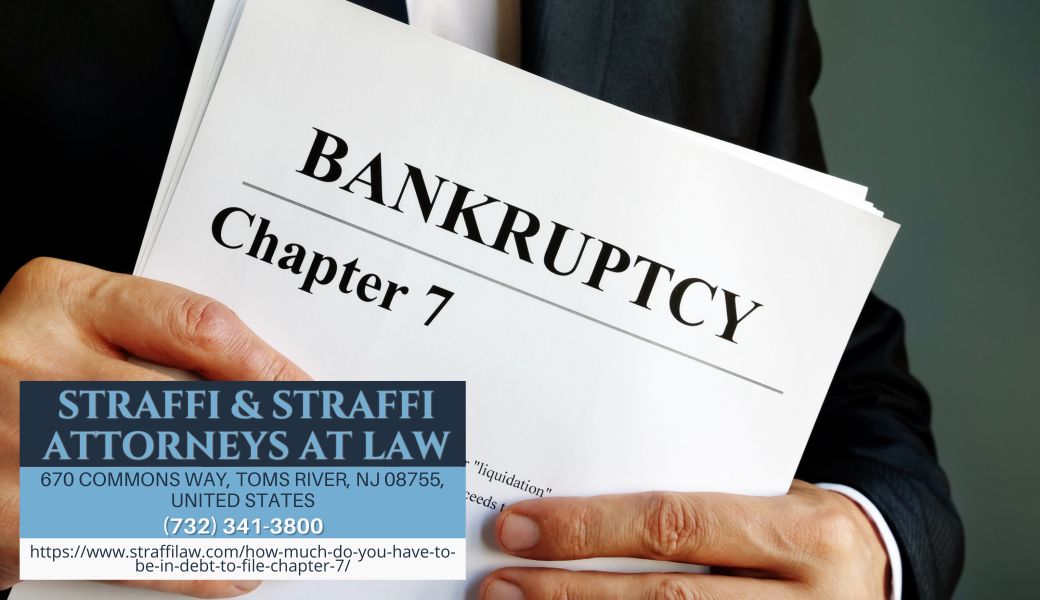New Jersey bankruptcy attorney Daniel Straffi (https://www.straffilaw.com/how-much-do-you-have-to-be-in-debt-to-file-chapter-7/), of Straffi & Straffi Attorneys at Law, provides essential insights into Chapter 7 bankruptcy and whether it is suitable for those struggling with their finances. In a recent article, Daniel Straffi emphasizes that Chapter 7 can be a powerful tool for discharging unsecured debts, such as credit card balances and medical bills, offering clients a fresh start.
Chapter 7 bankruptcy eligibility does not depend on a specific debt threshold. Contrary to what many people believe, there is no minimum or maximum debt amount required to file. New Jersey bankruptcy attorney Daniel Straffi explains that the key factor in determining whether a person qualifies for Chapter 7 in New Jersey is passing the “means test.” This test evaluates a person’s financial situation, including income and expenses, to decide if they are eligible for debt discharge under Chapter 7.
One of the critical aspects of filing for Chapter 7 bankruptcy in New Jersey is the means test, which primarily applies to individuals with higher incomes. For those whose income is below the state median for their household size, they are generally presumed to pass the means test and may qualify for Chapter 7 bankruptcy. New Jersey bankruptcy attorney Daniel Straffi outlines the median income levels in New Jersey for households of different sizes, starting at $60,317 for a single-member household and increasing based on household size. Straffi explains that if a person’s income exceeds these levels, further calculations are required to assess whether they have disposable income that could be used to repay some of their debts under a different bankruptcy plan, such as Chapter 13.
Asset status also plays a vital role in determining Chapter 7 eligibility. Daniel Straffi explains that while New Jersey bankruptcy law allows debtors to protect certain assets through exemptions, those with assets exceeding the allowable exemption limits may be required to liquidate some property to pay off creditors. Straffi further clarifies that New Jersey residents can choose between state-specific exemptions and federal exemptions, depending on which offers greater protection.
As Daniel Straffi explains, Chapter 7 bankruptcy is generally most beneficial for individuals with significant unsecured debts and limited disposable income. Those with primarily secured debts, such as mortgages or car loans, or who wish to retain certain assets, may find Chapter 7 less suitable for their needs. Daniel Straffi advises a careful evaluation of each person’s financial situation to determine whether Chapter 7 aligns with their goals.
When it comes to debts, Daniel Straffi highlights the distinction between dischargeable and non-dischargeable debts under Chapter 7 bankruptcy. Unsecured debts, such as credit card balances, medical bills, and personal loans, are typically dischargeable. This means that once the bankruptcy process is completed, the debtor is no longer legally responsible for repaying these obligations. However, secured debts, which are tied to specific collateral such as a house or car, are treated differently. Daniel Straffi points out that if debtors wish to keep secured property, they must generally stay current on payments and may need to reaffirm their commitment to repay the debt through a legal agreement.
Additionally, certain debts are considered “priority debts” and cannot be discharged through Chapter 7 bankruptcy. These include obligations such as child support, alimony, and certain tax debts. Federal student loans are also generally not dischargeable unless the debtor can demonstrate undue hardship. Daniel Straffi notes that understanding which debts can and cannot be discharged is critical when deciding whether to pursue Chapter 7 bankruptcy.
While Chapter 7 bankruptcy can provide significant relief, Daniel Straffi acknowledges that it comes with potential risks. The impact on credit is one such risk, as a bankruptcy filing can remain on a person’s credit report for up to 10 years, potentially affecting their ability to secure loans or credit in the future. Additionally, individuals may lose non-exempt property during the bankruptcy process, and there are restrictions on future bankruptcy filings for several years. However, for those overwhelmed by debt, the benefits of filing may outweigh these risks, particularly in terms of debt relief and the opportunity for a fresh start.
For individuals facing mounting debt and seeking a way forward, filing for Chapter 7 bankruptcy may be an effective solution. New Jersey bankruptcy attorney Daniel Straffi can help clients understand their options and guide them through each step of the process. By evaluating each client’s unique circumstances, Daniel Straffi strives to help them make informed decisions that will lead to financial relief and a more secure future.
About Straffi & Straffi Attorneys at Law:
Straffi & Straffi Attorneys at Law, located in New Jersey, can provide legal services with a focus on bankruptcy law. Led by New Jersey bankruptcy attorney Daniel Straffi, the firm is committed to helping clients resolve financial difficulties and regain control over their financial future. With a client-centered approach, Straffi & Straffi Attorneys at Law can offer personalized legal guidance through every step of the bankruptcy process, helping ensure that clients are well-informed and supported throughout their case.
Embeds:
Youtube Video: https://www.youtube.com/watch?v=hxS7Q7McbIE
GMB: https://www.google.com/maps?cid=18340758732161592314
Email and website
Email: familyclient@straffilaw.com
Website: https://www.straffilaw.com/
Media Contact
Company Name: Straffi & Straffi Attorneys at Law
Contact Person: Daniel Straffi
Email: Send Email
Phone: (732) 341-3800
Address:670 Commons Way
City: Toms River
State: New Jersey 08755
Country: United States
Website: https://www.straffilaw.com/
Press Release Distributed by ABNewswire.com
To view the original version on ABNewswire visit: New Jersey Bankruptcy Attorney Daniel Straffi Releases Article on Chapter 7 Bankruptcy Eligibility for Debt Relief
